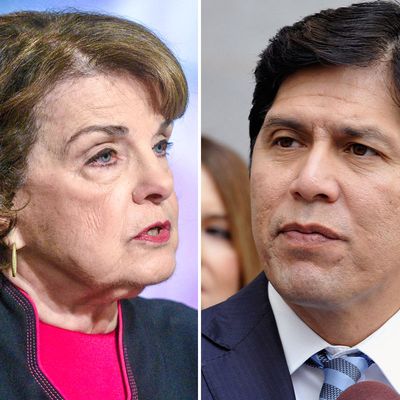
Under California’s much-discussed and very controversial top-two primary system, two candidates from the same party can and do “lock out” the other party from general elections. That’s because all candidates, regardless of party, run on the same primary ballot. Whoever finishes first and second (regardless of percentage) gets a ticket to November.
That happened in the 2016 U.S. Senate race in which Democrats Kamala Harris and Loretta Sanchez were the general-election candidates, with Harris winning handily in both the primary and in November. And it’s happening again this year, when incumbent Senator Dianne Feinstein and state senate Democratic leader Kevin de León are competing in the general election.
One of the mysteries of top two is what voters from a party disenfranchised in a particular election decide to do. Will they give it a pass? Vote against the other party’s incumbent? Or vote for the other party’s candidate whose ideology is closest to their own? In the case of Feinstein and de León, it obviously could matter if Republicans voted en masse against Feinstein as the hated long-standing incumbent or voted for Feinstein as the relative “centrist” in the race (indeed, the idea the Feinstein is too friendly to Republicans is a big part of the argument against her among progressive Democrats).
A new poll from the well-regarded Public Policy Institute of California (PPIC) supplies some clues about these questions. The most interesting finding is that about half of self-identified Republicans and a quarter of self-identified independents say they don’t plan to vote for either Democrat. Among those who do intend to vote in the Senate race, Republicans split right down the middle between Feinstein and de León, while indies (not unexpectedly, given Feinstein’s professed independence) lean toward the incumbent.
What this essentially means is that Democrats will more or less get to choose between the two members of their own party in this race. At the moment, that’s great news for Feinstein, who according to PPIC leads de León by a three-to-one (66/22) margin among self-identified Democrats. But then again, de León is the endorsed candidate of the California Democratic Party, a fact that might (along with some of the money and materials the state party could make available to him) feed a pretty robust comeback down the road. Should that begin to happen, it will be interesting to see if Feinstein decides to make an open bid for Republican support. It’s worth remembering that this was central to Loretta Sanchez’s strategy in 2016, and it didn’t work.






























